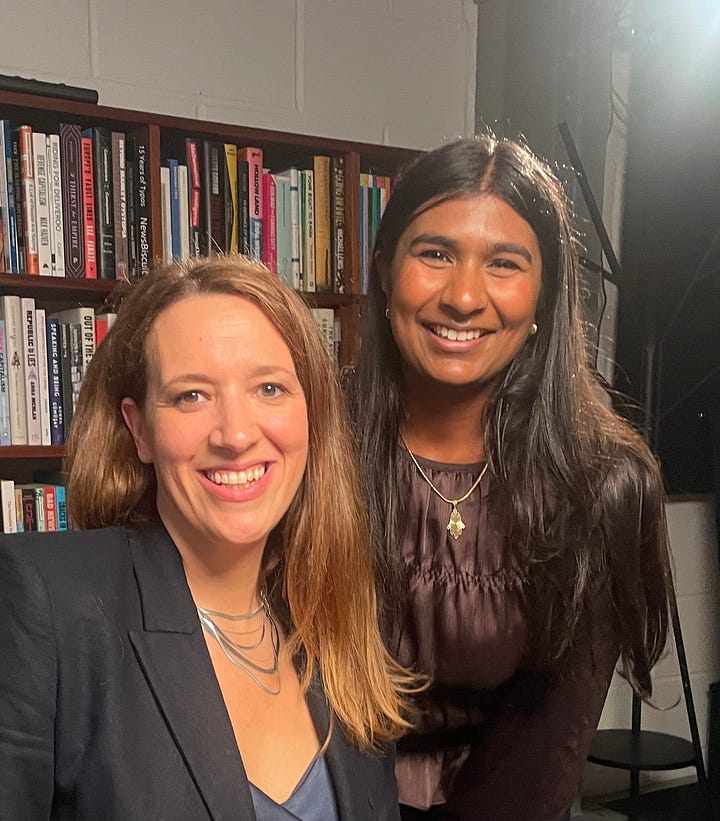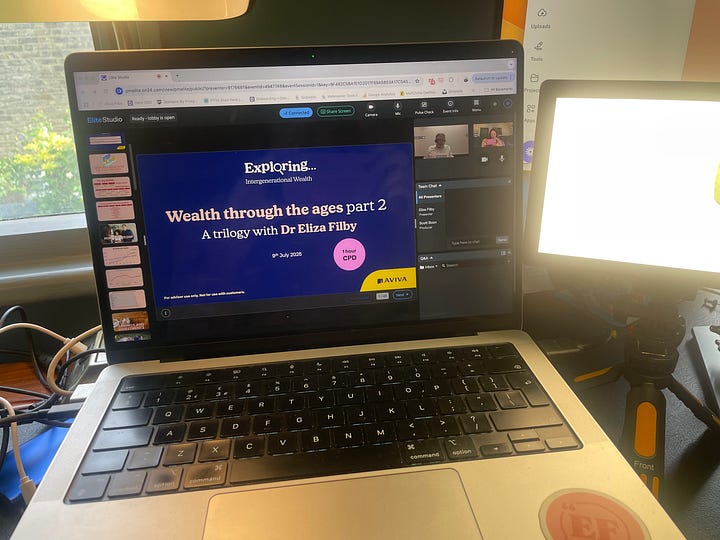How to subvert the Inheritocracy
Knowing how the system works is empowering (rather than depressing), because here's how people are gaming this system.
“I found it all quite depressing; what can those who don’t have the Bank of Mum and Dad do?”
That was Jimmy McLoughlin’s reflection during our recent interview on his podcast about my book. I didn’t really know how to respond. He was right. It is all a bit depressing. And the economic news isn’t improving. In fact, since I wrote the book in 2024, the inheritocracy in the UK at least has only deepened.
Understanding the trends shaping our lives - economic, social, technological - can sometimes feel overwhelming (though I hope, at times, empowering). But, as Jimmy rightly pointed out, the inevitable next question is: So what do we do?
I’m not a financial advisor, nor a politician, but never one to shy away from a challenge, I thought it was worth trying to answer just that. So I re-listened to my book (yes, there is an audiobook version) and realised it’s full of stories - stories of people who’ve succeeded without the Bank of Mum and Dad. So I wrote.
So, here are SEVEN things that meritocratic Millennials and Gen Z without the Bank of Mum and Dad that I interviewed had in common and are doing to navigate and succeed in an economy driven evermore by parental wealth:
They were self-educated about money. There’s a reason why FinTok or financial influencers have exploded over the past couple of years. Clue: it’s not just because traditional financial advice feels stuffy, it’s because that advice often doesn’t speak to our modern realities. Yes, financial influencers are unregulated, but what stood out in my interviews was the number of people who said they felt compelled to research the intricacies of money (tax, pensions, savings plans) as thoroughly as possible. I heard it so often that it convinced me I needed to do the same; especially as a self-employed woman who had a slow path to work (too much study) and significant time out of the workforce due to education and babies. It’s amazing how ignorant we all are about money, and how often even what we do know changes.
Our financial attitudes are reportedly formed between the ages of 7 and 12, which really means that we have an emotionally complex relationship with money. There can be a lot of regret and shame bound up in the subject. But I lost count of how many interviewees told me they found it both strategic and empowering to not just reprogram their mindset, but to set aside regular time each month to actively learn about money. We live within a complex system, and we won’t learn it at school, or all of it on YouTube, or by outsourcing it to ChatGPT. The only piece of advice I have on this approach is to try to avoid going down the weird rabbit holes - there are a lot of them.
They lived outside of London. Yes, it’s an obvious one, and, speaking as a Londoner, a depressing one. If you have a young family (or frankly, even if you don’t), it increasingly makes sense to move out of the capital. That’s exactly what’s been happening, which is why pupil numbers in some London boroughs are down by 30%, and primary schools are closing.
The real ‘winners’ are those who can earn London salaries while living in areas where housing is far cheaper - well beyond the M25. For many, that means navigating the tension of securing a London-level income while maintaining a commute that works, especially for dual-income couples with children. But with return to office mandates, it inevitably means that the mother (and it is most obviously the mother) is sometimes not able to build their career in the same way that the partner can.
They were often supporting parents or living close to them. Many relied on their parents for childcare, but, and this is the critical point, they were also expecting, or already planning, to move their parents in or create some form of multigenerational household in the near future. In other words, they had accepted that the ideal of individual independence or even the traditional two-generation, 2.4-kids family unit is increasingly unrealistic in today’s economy. Some say the UK is becoming more ‘Asian’ in its approach, with rising intergenerational co-dependency. I’d say it’s simply that some people are learning not to rely on the state or market forces to dictate their life choices or standard of living.
They were often young DINKs (yes, Dual Income, No Kids). Over the last twenty years, we’ve extended our ‘freedom’ years: living with friends, travelling, extending our education, or living with partners before ‘settling down’. This is an incredibly expensive way to do life. To be clear, I’m not saying there’s anything wrong with that (I didn’t meet my significant other until I was 34). Rather, it’s an observation: the meritocratic millennials thriving without the Bank of Mum and Dad were often those who had coupled up relatively early, formed dual-income households, shared expenses, and built financial security — or even wealth — together from a comparatively young age. There was also often a degree of financial equality between them, because, well, you need two incomes to thrive and survive these days.
They were not artists, journalists, or creatives! We know that the only people who can increasingly afford a creative career are those with access to the Bank of Mum and Dad. We have seen twenty years of elite overproduction to whom much was promised, and yet with depleting rewards.
So, where does work actually pay? STEM-related careers, highly skilled engineers or in manufacturing, accountants (though for how much longer, with AI?), and those running small businesses in the trades. These cohorts are often forgotten in left-wing politics and certainly not written about in London-centric newspapers. They are often not necessarily on traditional career tracks. What stood out was a growing savviness around career choice and the relationship between work and reward. James Kanagasooriam’s recent piece in The Times on the ‘collar flip’ (that is the shift in prestige and earning power from white-collar to blue-collar roles) suggests that this group will only rise in number and prominence as AI erodes the status and wage power of traditional white collar jobs.
Many had multiple streams of income. Several people I spoke to had either a rental property or were generating money through online platforms, but all saw their financial future as something that extended beyond a single wage. One interviewee, a qualified professional now running his own business, told me his dream was for his job to eventually become his hobby while his assets appreciated. From twenty-somethings selling on Depop to forty-somethings pursuing portfolio careers, some of the most successful meritocrats were those thinking fluidly about money. In many ways, it’s a return to how our grandparents approached finances before the era of fixed careers, fixed salaries, and fixed paydays.
They were committed to building generational wealth for their kids. The irony, of course, is that many of the people I spoke to were actively creating a system that had disadvantaged them. They were building the very inheritocracy they had struggled to navigate. No judgment here; what could be more natural than helping your kids? They were determined to give their children the kind of support they had lacked - whether that meant helping with education costs, offering a financial safety net, or simply ensuring their kids wouldn’t face the same uphill struggle.
These aren’t rules for life, just commonalities that I noticed across the millennials/Gen Z without the Bank of Mum and Dad - I’d love to know what else you are seeing/doing?
The paperback edition of Inheritocracy publishes on 17th July, and can be preordered here, while the audiobook is also available on Spotify and all good audiobook platforms.


Thanks for reading,
Eliza





